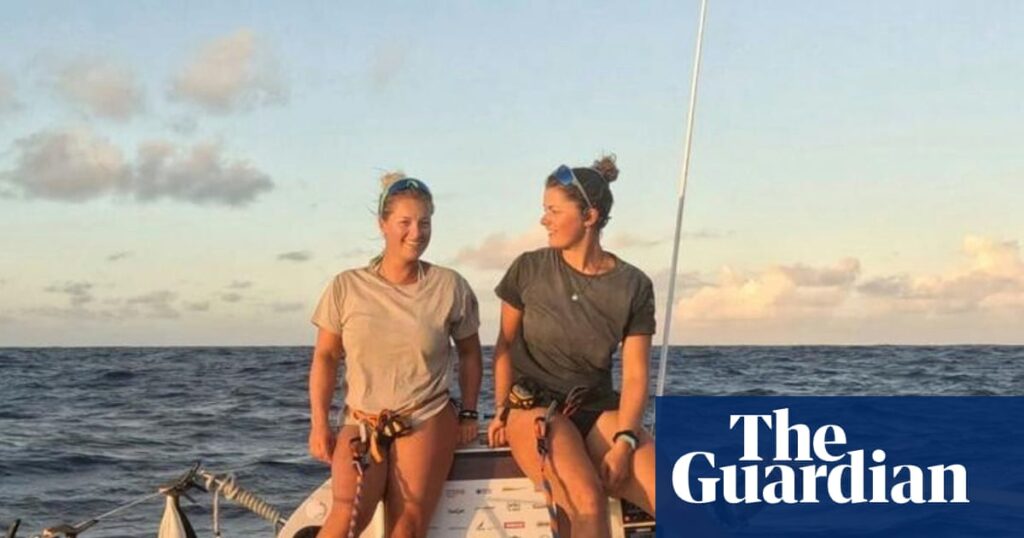The physical and mental challenges have been immense, the setbacks numerous. The pair have endured searingly hot days and chilly nights and dealt with debilitating blisters and salt sores.
They have been faced with a series of equipment failures (using a pair of underpants to fix one crucial bit of kit) and there was a pretty tense moment when they feared a pair of curious marlins swimming under their boat might pierce their hull.
Miriam Payne and Jess Rowe, who are two-thirds of the way through an 8,000-mile row across the Pacific from Peru to Australia, are weary – but relishing the experience.
Speaking to the Guardian via satellite phone at a dawn shift change – they do two hours on, two off during the night – Rowe said: “I’m very tired, I won’t lie. It’s just so hard to wake up for your shift. We’re both not even hearing our alarms any more. They go off for 10 or 15 minutes and then whoever’s rowing has to wake the other. It’s pretty tough. Apart from the sleep deprivation, we’re loving it.”
Rowe, 28, from Hampshire, and Payne, 26, from East Yorkshire, are veterans of Atlantic rows and met, appropriately, at the Blue Marlin bar in La Gomera, one of the Canary Islands, a haunt for ocean adventurers, where they hatched the plan to tackle the Pacific.
If they succeed they will become the first women’s team and the first pair to row the Pacific non-stop and unsupported.
They have been out for more than 100 days – and reckon they have about 60 left. Rowe said: “We’ve reached the point where we’ve got a similar distance to an Atlantic to row. We’ve both rowed the Atlantic, so we’re like: ‘it’s OK, we’ve just got an Atlantic left.’”
They have fallen in love with the Pacific. Rowe said: “Everybody thinks that perhaps we’re in massive storms every day and we’re facing 30ft waves. It’s not always like that. We’ve had so many days when it’s been flat calm. The Pacific – the peaceful one.
“There’s something about rowing that’s meditative. You don’t really think about it, you go into a rhythm. I think it also helps having the most amazing 360-degree view and all the night skies and the sunsets.”
Payne and Rowe spent months organising the trip, from finding and refurbishing their 30ft-long boat Velocity to vacuum-packing hundreds of meals.
Getting enough nutrition is vital. They need to take on 5,000 calories a day. “We really miss fresh fruit and vegetables,” Rowe said. “We are craving things like mangoes and carrots. We’re pretty fed up of the freeze-dried and dehydrated food.”
They have solar panels but getting enough power has been a struggle; they had to use a pair of Calvin Klein underpants to replace a lost filter on a fresh water maker. Unsurprisingly, fresh water and reliable power are two things they look forward to.
Despite the setbacks, they still get on well. “You can get to know each other and spend as much time together as possible before, but you never know what can happen out here,” said Rowe. “But we’re both pretty relaxed personalities. We’ve both listened to each other’s opinions on things and we’re already planning a holiday together afterwards.”
after newsletter promotion
The pair jump into the water every four days to clean the hull and keep the boat as streamlined as possible. They look forward to these dips as it’s the most they’re able to stretch out and follow it up with a wash with fresh water and clean clothes – a real treat. There is no toilet onboard – it is a “bucket and chuck it” situation.
As well as the marlins, they have spotted a sperm whale and plenty of shark fins. They enjoyed a hitchhiker joining them – a masked booby seabird, probably from the Galápagos Islands – and do not get bored of the sight of phosphorescence in the wake.
The pair, who are raising money for the charity Outward Bound Trust, have no idea of world events since they left. Payne said: “It’s quite nice. It’s always just bad news all the time, especially the last few years. In some ways, you do wonder what’s going on, but it is nice just to have a digital detox and be out of the loop.”
She is looking forward to a stroll on dry land. “The muscles you use for walking have wasted away a bit. It’s going to be nice to move in a different way but we’re still strong.”
Asked how they kept going, Payne said they had no choice, really. “If we don’t keep rowing we’ll be bobbing around and going God knows where. You’ve got to keep rowing because that’s the way to survive. So you just go on with it. We keep plodding along.”

